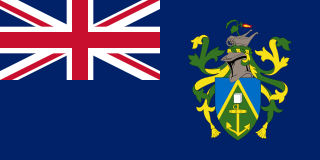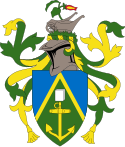
The Pitcairn Islands, officially Pitcairn, Henderson, Ducie and Oeno Islands, are a group of four volcanic islands in the southern Pacific Ocean that form the sole British Overseas Territory in the Pacific Ocean. The four islands—Pitcairn, Henderson, Ducie and Oeno—are scattered across several hundred miles of ocean and have a combined land area of about 18 square miles (47 km2). Henderson Island accounts for 86% of the land area, but only Pitcairn Island is inhabited. The inhabited islands nearest to the Pitcairn Islands are Mangareva, 688 km to the west, as well as Easter Island, 1,929 km to the east.

The Pitcairn Islands are a British Overseas Territory in the South Pacific Ocean, with a population of about 50. The politics of the islands takes place in a framework of a parliamentary representative democratic dependency, whereby the Mayor is the head of government. The territory's constitution is the Local Government Ordinance of 1964. In terms of population, the Pitcairn Islands is the smallest democracy in the world.

Adamstown is the capital of the Pitcairn Islands, and the only settlement on the Pitcairn Islands, the only British Overseas Territory that is located in the southern Pacific Ocean.

The history of the Pitcairn Islands begins with the colonization of the islands by Polynesians in the 11th century. Polynesian people established a culture that flourished for four centuries and then vanished. They lived on Pitcairn and Henderson Islands, and on Mangareva Island 540 kilometres (340 mi) to the northwest, for about 400 years.
Steven Raymond Christian is a politician, convicted sex offender and child rapist from the Pitcairn Islands. He was mayor of the islands from 1999 until 2004, when he was removed from office after being found guilty in the Pitcairn child sexual abuse trial.
In 2004, seven men living on Pitcairn Island faced 55 charges relating to sexual offences against children and young adults. The accused represented a third of the island's male population and included Steve Christian, the mayor. On 24 October, all but one of the defendants were found guilty on at least some of the charges. Another six men living abroad, including Shawn Christian, who later served as mayor of Pitcairn, were tried on 41 charges in a separate trial in Auckland, New Zealand, in 2005.
Jay Calvin Warren is a political figure from the Pacific territory of the Pitcairn Islands.
Meralda Elva Junior Warren is an artist and poet of the Pitcairn Islands, a remote British Overseas Territory in the South Pacific. She works in both English and Pitkern, the island's distinctive creole language. Her book, Mi Bas Side Orn Pitcairn, written with the island's six children, is the first to be written and published in both English and Pitkern. As an artist, she works with tapa cloth, a Polynesian tradition. She has also published a cookbook featuring Pitcairn Island cuisine.

The legal system of Singapore is based on the English common law system. Major areas of law – particularly administrative law, contract law, equity and trust law, property law and tort law – are largely judge-made, though certain aspects have now been modified to some extent by statutes. However, other areas of law, such as criminal law, company law and family law, are almost completely statutory in nature.
Betty Christian is the Communications Officer and Island Secretary of the Pitcairn Islands. Appointed by the colonial Governor, the Island Secretary is an ex officio member of the Island Council, the legislative body of Britain's last remaining Pacific colony. She previously served as an elected member of the Council in 1990 and 1993.

The High Court of Singapore is the lower division of the Supreme Court of Singapore, the upper division being the Court of Appeal. The High Court consists of the chief justice and the judges of the High Court. Judicial Commissioners are often appointed to assist with the Court's caseload. There are two specialist commercial courts, the Admiralty Court and the Intellectual Property Court, and a number of judges are designated to hear arbitration-related matters. In 2015, the Singapore International Commercial Court was established as part of the Supreme Court of Singapore, and is a division of the High Court. The other divisions of the high court are the General Division, the Appellate Division, and the Family Division. The seat of the High Court is the Supreme Court Building.

The Court of Appeal of Singapore is the highest court in the judicial system of Singapore. It is the upper division of the Supreme Court of Singapore, the lower being the High Court. The Court of Appeal consists of the chief justice, who is the president of the Court, and the judges of the Court of Appeal. The chief justice may ask judges of the High Court to sit as members of the Court of Appeal to hear particular cases. The seat of the Court of Appeal is the Supreme Court Building.

Law enforcement in the Pitcairn Islands is the responsibility of the Pitcairn Islands Police, the smallest British police force, which has just two constables. In the aftermath of child sexual abuse revelations, the force did briefly number five constables including Ministry of Defence Police officers on temporary secondment. Historically, and until 2000, a Pitcairn Island resident was appointed as the island group's sole police officer, and also acted as immigration and customs officer. From 2000 to 2015, the combined police, immigration, and customs role was held by a series of foreign professionals on short-term secondment. In 2015 the Pitcairn Government website announced that both previous systems would be employed alongside each other, with one local island police officer and one foreign police officer on secondment, working together.
Child erotica is non-pornographic material relating to children that is used by any individuals for sexual purposes. It is a broader term than child pornography, incorporating material that may cause sexual arousal such as nonsexual images, books or magazines on children or pedophilia, toys, diaries, or clothes. Law enforcement investigators have found that child erotica is often collected by pedophiles and child sexual abuse offenders. It may be collected as a form of compulsive behavior and as a substitute for illegal underage pornography and is often a form of evidence for criminal behavior.
Legal frameworks around fictional pornography depicting minors vary depending on country and nature of the material involved. Laws against production, distribution and consumption of child pornography generally separate images into three categories: real, pseudo, and virtual. Pseudo-photographic child pornography is produced by digitally manipulating non-sexual images of real minors to make pornographic material. Virtual child pornography depicts purely fictional characters. "Fictional pornography depicting minors", as covered in this article, includes these latter two categories, whose legalities vary by jurisdiction, and often differ with each other and with the legality of real child pornography.
An obscenity is any utterance or act that strongly offends the prevalent morality of the time. It is derived from the Latin obscēnus, obscaenus, "boding ill; disgusting; indecent", of uncertain etymology. Generally, the term can be used to indicate strong moral repugnance and outrage in expressions such as "obscene profits" and "the obscenity of war". As a legal term, it usually refers to descriptions and depictions of people engaged in sexual and excretory activity.
United States obscenity law deals with the regulation or suppression of what is considered obscenity and therefore not protected speech or expression under the First Amendment to the United States Constitution. In the United States, discussion of obscenity typically relates to defining what pornography is obscene, as well as to issues of freedom of speech and of the press, otherwise protected by the First Amendment to the Constitution of the United States. Issues of obscenity arise at federal and state levels. State laws operate only within the jurisdiction of each state, and state laws on obscenity differ. Federal statutes ban obscenity and child pornography produced with real children. Federal law also bans broadcasting of "indecent" material during specified hours.

[[File:Same-sex marriage map Oceania.svg|thumb|300px||1.5|Recognition of same-sex relationships in Oceania {{legend-shell|lang=en|title=Laws regarding same-sex sexuality in Oceania|
Same-sex marriage has been legal in the Pitcairn Islands since 14 May 2015. An ordinance to permit same-sex marriages was passed unanimously by the Island Council on 1 April 2015, and received royal assent by Governor Jonathan Sinclair on 5 May.

Lesbian, gay, bisexual, and transgender (LGBT) people in the British Overseas Territory of the Pitcairn Islands enjoy most of the same rights as non-LGBT people. Same-sex sexual activity is legal, discrimination based on sexual orientation is constitutionally outlawed and same-sex marriage has been legal since 14 May 2015.














